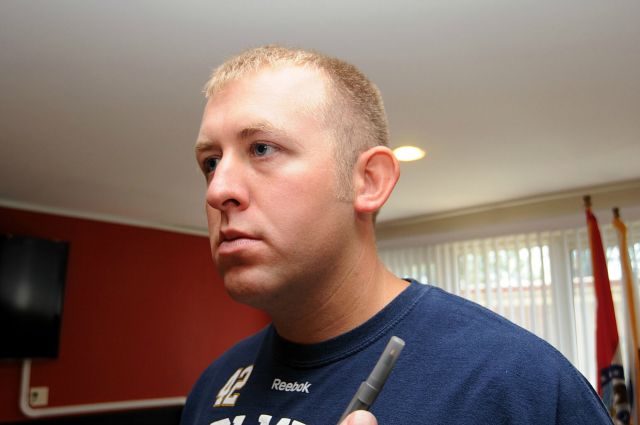The Dog-Whistle Racism Of Darren Wilson's First Interview Since Michael Brown Shooting
By aaroncynic in News on Aug 4, 2015 8:25PM

via Getty Images
Former Ferguson police officer Darren Wilson wants the world to know that racism isn’t really all that big of a deal these days, and that he wants to move on from any discussion of his shooting of Michael Brown. Those are two of the big takeaways from the lengthy New Yorker profile of the 29-year old former cop who shot and killed an unarmed black man that sparked a national movement to fight institutionalized racism in policing.
“I’m not going to keep living in the past about what Ferguson did. It’s out of my control,” Wilson told Jake Halpern, who said he hadn’t read the Justice Department’s scathing report of racism inside the Ferguson Police Department, which was commissioned in the wake of Michael Brown’s death and subsequent protests which often ended with large quantities of tear gas wafting over the streets of the St. Louis suburb.
Halpern spent several days at Wilson’s home, only described as being located on a “nondescript dead-end street on the outskirts of St. Louis.” According to the interview, few people know the former police officer lives there, and his name is not on the deed. This is to guard against reported death threats against Wilson and his family.
Despite the failure of a court to indict Wilson on murder charges, the former Ferguson cop who resigned during the aftermath of the shooting of Brown, said he's been turned down for the few police jobs he's applied to. “It’s too hot an issue, so it makes me unemployable,” said Wilson.
While the profile can be read in a few ways—and at times it almost seems to attempt to elicit sympathy for Wilson—his own words often highlight just how insulated police can be from criticism and accountability, and often ignore the structural racism that exists in the relationships police have with communities of color.
In one of the more damming parts of the interview, Wilson says he chooses to ignore the relationship race has between police and the communities they serve:
“Everyone is so quick to jump on race. It’s not a race issue.” There were two opposing views about policing, he said: “There are people who feel that police have too much power, and they don’t like it. There are people who feel police don’t have enough power, and they don’t like it.”
Talking about his experience as an officer in Jennings, his post prior to Ferguson, Wilson told Halpern he felt intimidated and unprepared in a community that was nearly all black with a quarter of its residents living below the poverty line.
The Jennings Police Department has a long history of racism. Wilson’s mentor in Jennings, officer Mike McCarthy, showed Halpern police logs dating back to the '70s that featured plenty of racist rhetoric, and in one case, the words “kill the fucker” were written below the file of an African-American male who was suspected of being involved in a police shooting. McCarthy said that police resist discussing race:
“If an officer speaks out, they are ostracized. They don’t want anything negative to be out there. But we’re humans—there’s gonna be negative. Be honest about it. If you acknowledge it, that’s the first step.”
Despite these words by his mentor, Wilson disagreed, saying “People who experienced that, and were mistreated, have a legitimate claim. Other people don’t.” When asked if young people in the area “used this legacy as an excuse” by Halpern, he said he thought so.
In all, while there will certainly be some that might have some shred of sympathy for Wilson in the aftermath of the incident that took place nearly a year ago, it’s hard not to see past the carefully coding wording of some of the former cop’s words. When asked if he misses going out, Wilson leaves little ambiguity to his feelings on people of different races. “We try to go somewhere—how do I say this correctly?—with like-minded individuals. You know. Where it’s not a mixing pot.”